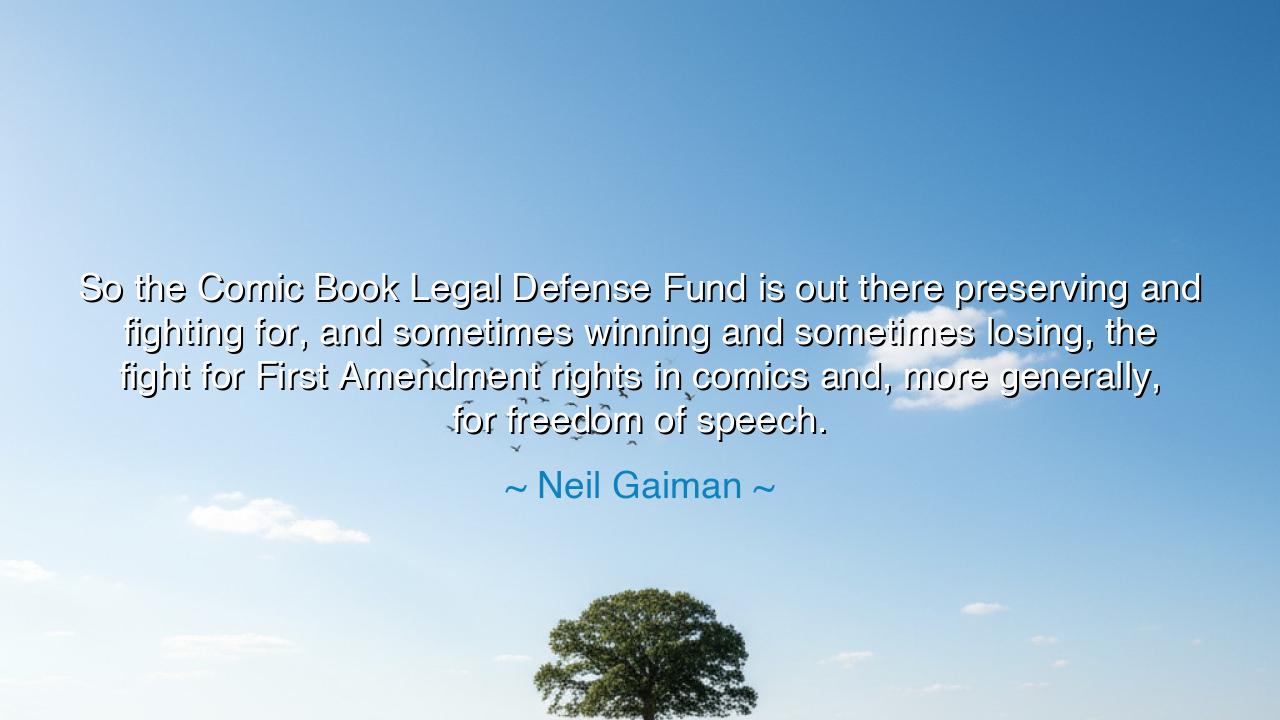
So the Comic Book Legal Defense Fund is out there preserving and
So the Comic Book Legal Defense Fund is out there preserving and fighting for, and sometimes winning and sometimes losing, the fight for First Amendment rights in comics and, more generally, for freedom of speech.






Hear the words of Neil Gaiman, teller of tales and defender of stories, who declared: “So the Comic Book Legal Defense Fund is out there preserving and fighting for, and sometimes winning and sometimes losing, the fight for First Amendment rights in comics and, more generally, for freedom of speech.” In this saying lies not merely the defense of drawings and panels, but the defense of the soul of expression itself. For the comic book, though humble in form, has carried visions, truths, and rebellions that some would rather silence.
The origin of this saying lies in Gaiman’s long connection to the Comic Book Legal Defense Fund (CBLDF), a nonprofit formed in 1986 to protect artists, writers, and retailers who faced prosecution or censorship for the works they sold and created. In those days, comics were still branded by many as corrupting influences, unworthy of protection, fit only for suspicion. But the defenders of free expression knew that if one form of art could be silenced, then all forms stood in peril. Gaiman, whose own works have often been bold, strange, and boundary-breaking, lent his voice to this cause, knowing that the fight for comics was in truth the fight for all speech.
History provides echoes of this eternal struggle. Recall the trial of Socrates in ancient Athens, condemned for corrupting the youth with his questions. His only crime was to speak what others feared to hear. Or think of Galileo, silenced for describing the heavens as they truly are. These stories remind us that suppression of expression is always clothed in the guise of protection—protection of morality, of order, of tradition. But in truth, it is fear that drives censorship, fear of new ideas that threaten the comfort of the powerful. So too with comics: beneath the bright ink and bold lines lies imagination that unsettles, provokes, and awakens.
The CBLDF, as Gaiman describes, has known both victory and defeat. Some cases have ended with speech defended, others with speech curtailed. Yet the fight itself is noble, for it embodies the truth that freedom is never given once and forever—it must be won again and again. Each courtroom battle is but a skirmish in the eternal war for the right to think, to speak, to create. Gaiman’s words remind us that the worth of the struggle is not measured only in victories, but in the very act of resistance.
The deeper meaning of his teaching is that the defense of comics is a stand for the First Amendment itself. For freedom of speech cannot be selective. If it is denied to one artist, to one form, to one voice deemed unworthy, then it is weakened for all. To defend the comic book, often dismissed as trivial, is in truth to defend the principle that all speech, whether in sacred text or humble pulp, has the right to exist.
The lesson for us is clear: never take freedom of speech for granted. The moment we assume it is secure, it begins to slip away. When we hear of a book banned, a comic seized, a voice silenced, we must not say, “It does not matter, for it is only this or that.” We must say, “If it is silenced, then so may we all be silenced.” To protect the small is to safeguard the great. To defend the strange is to preserve the familiar.
And what shall we do in our own lives? Support the organizations that stand guard over expression. Read boldly, write fearlessly, speak truth even when it is unpopular. Teach our children that art, even when it unsettles, deserves its place. And when we see censorship cloaked in the guise of righteousness, let us be wise enough to know that suppression today may become tyranny tomorrow.
So remember the teaching of Neil Gaiman: the fight of the Comic Book Legal Defense Fund is not only about comics, but about the soul of liberty itself. Sometimes it wins, sometimes it loses, yet the struggle must never cease. For without freedom of speech, the stories of the world fall silent, and when stories are silenced, the people themselves are no longer free.






AAdministratorAdministrator
Welcome, honored guests. Please leave a comment, we will respond soon